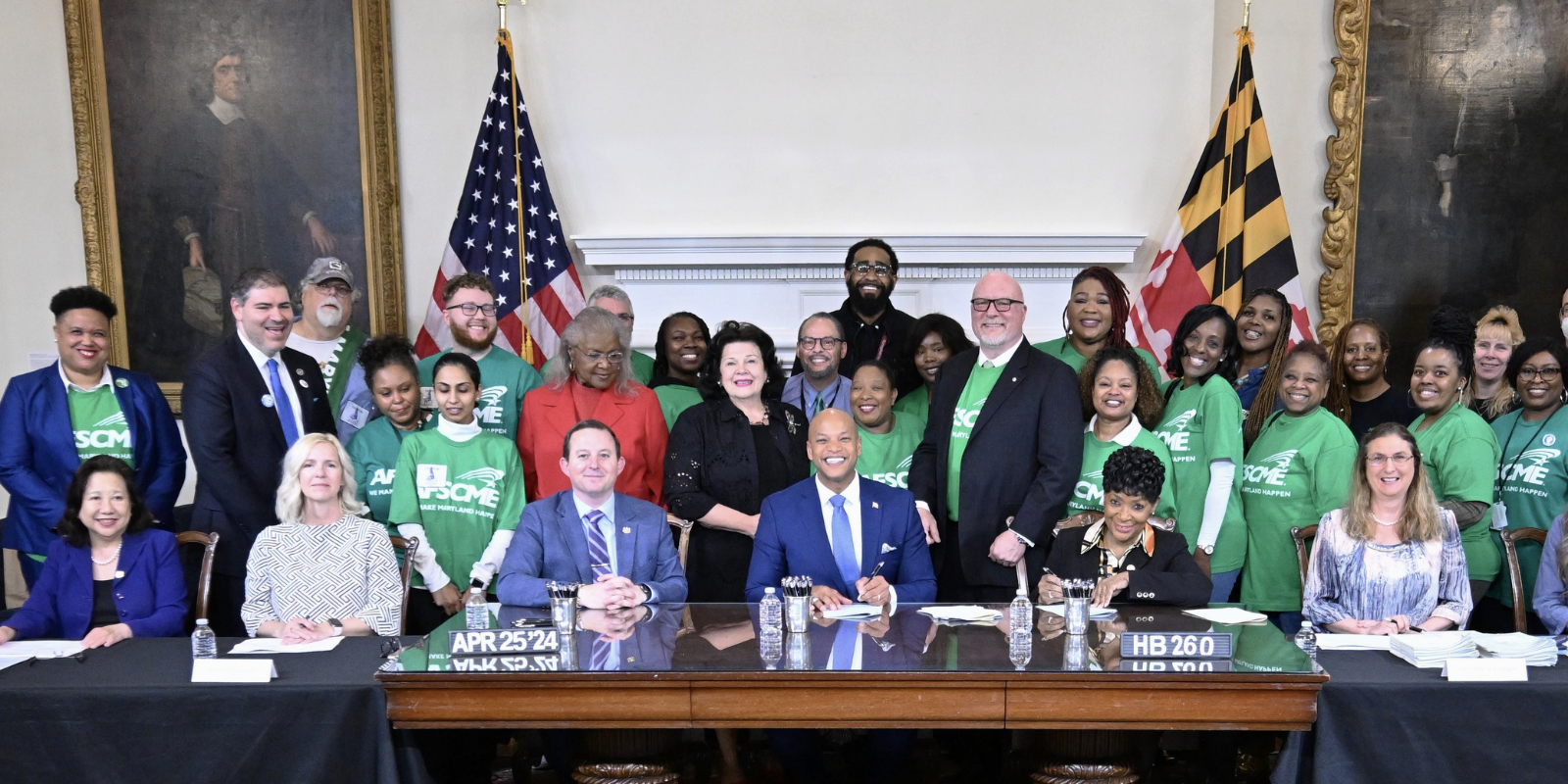Thousands of supervisors who work for the state of Maryland now have collective bargaining rights. And AFSCME supervisor members are ready to organize and win their union after working hard to pass the legislation that made it possible.
Last month, at a bill-signing ceremony attended by dozens of AFSCME Maryland Council 3 members, Maryland Gov. Wes Moore signed HB 260/SB 192, which allows over 5,000 supervisors employed by the state of Maryland to negotiate for a contract.
“Our administration has always been proud to lift up, and support, the work that our dedicated state employees do,” Moore said. “This bill underscores that. By working in partnership with AFSCME, state supervisors can choose their exclusive representative, and we can continue our efforts to reduce vacant state government positions. We are ensuring that more of the people who make Maryland happen every day have a voice in our shared future.”
The legislation goes into effect Oct. 1. A majority of state supervisors will need to demonstrate support for AFSCME as their authorized collective bargaining agent as the first step to start the process of negotiating a union contract.
Following the bill signing, supervisors held a worksite blitz to share the news, answer questions and sign up co-workers for the AFSCME Maryland Supervisors Union.
AFSCME already represents nearly 45,000 public service workers in Maryland, including over 20,000 state employees across a variety of state agencies. Nationally, supervisors in a dozen states have organized with AFSCME, as have Maryland supervisors in the Prince George’s County Health Department, Baltimore City Housing Authority and in Howard County.
“Allowing state supervisors to have a voice in their work and a protected say on the job is long overdue,” said AFSCME Maryland President Patrick Moran, who’s also an AFSCME vice president. “We’re grateful to our elected leaders for listening to what Maryland’s state supervisors had to say, and this wouldn’t have been possible without the hundreds of AFSCME members who showed up every week during this legislative session to make their voices heard. Now, these supervisors have a chance to share their expertise and experience and be equal partners in making our state agencies and state services the best that they can be.”
AFSCME Maryland member LaShonda Dreher, a supervisor who works for the Division of Parole and Probation, said: “I want to thank the legislature and Governor Moore for supporting me and thousands of hardworking state supervisors who now can have the dignity of having a seat at the table when it comes to our work.”
For Walter Moore, Jr., security attendant supervisor at Springfield Hospital Center, AFSCME solidarity was key to the victory.
“I couldn’t be prouder to be an AFSCME member because I know we’re a union that stands together and fights for all of us – whether that’s passing collective bargaining rights in Annapolis or fighting for better working conditions in our workplaces.”
Christal Cooper, a customer agent supervisor at the Motor Vehicle Administration, said the bill will improve the staffing crisis at state agencies.
“We are facing a real staffing crisis in many agencies across Maryland, but with this law we’ll be able to have a voice at the table to improve our jobs through negotiating a contract and help reduce turnover in our worksites,” Cooper said.
In addition to the legislation for state supervisors, Moore also signed into law HB 609/SB 591. This legislation allows more than 2,000 people who work in Maryland’s public libraries to form and join unions and participate in collective bargaining.
Together, these pieces of legislation represent the largest expansion of collective bargaining rights in Maryland at the legislative level in the past decade. Many AFSCME Maryland members who were involved in efforts to pass these bills recognized the significance of these legislative wins.
“The right to form a union, and the right to collectively bargain, is not just about negotiating a contract,” said Nicole Spencer, a field supervisor for the Division of Parole and Probation. “It’s about feeling seen, heard, and respected. With the passage of this bill, supervisors are gaining a voice. Now, we are ready to use it.”
